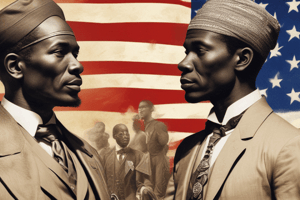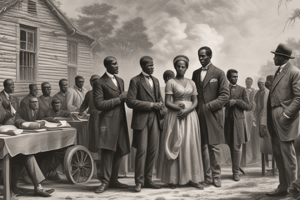Podcast
Questions and Answers
What was the main purpose of the Reconstruction Acts of 1867?
What was the main purpose of the Reconstruction Acts of 1867?
- To grant voting rights to women
- To divide the South into five districts under military occupation
- To ensure the enforcement of laws in the South (correct)
- To propose the Fourteenth Amendment
What was the result of the impeachment of Andrew Johnson?
What was the result of the impeachment of Andrew Johnson?
- He resigned from office
- He was rendered powerless to direct future Reconstruction policies (correct)
- He was removed from office
- He was given more power to veto Congress
What was the effect of the Fifteenth Amendment on the women's rights movement?
What was the effect of the Fifteenth Amendment on the women's rights movement?
- It split the women's rights movement into two groups (correct)
- It granted voting rights to women
- It recognized women's right to vote
- It denied voting rights to newly freed black men
What was the significance of the Fourteenth Amendment?
What was the significance of the Fourteenth Amendment?
What was the Tenure of Office Act of 1867 about?
What was the Tenure of Office Act of 1867 about?
What was the purpose of the National Woman Suffrage Association?
What was the purpose of the National Woman Suffrage Association?
What was the main goal of the Reconstruction period from 1865 to 1877?
What was the main goal of the Reconstruction period from 1865 to 1877?
What was the minimum test of political loyalty required for southern states to return to the Union under Lincoln's Ten-Percent Plan?
What was the minimum test of political loyalty required for southern states to return to the Union under Lincoln's Ten-Percent Plan?
Why was Lincoln's plan for Reconstruction considered lenient?
Why was Lincoln's plan for Reconstruction considered lenient?
What was the result of the clash between President Andrew Johnson and Congress?
What was the result of the clash between President Andrew Johnson and Congress?
What was the purpose of the Freedman's Bureau?
What was the purpose of the Freedman's Bureau?
What was the significance of the Civil Rights Act of 1866?
What was the significance of the Civil Rights Act of 1866?
Flashcards are hidden until you start studying
Study Notes
- The Civil War ended with the surrender of the South to the North, leading to the Reconstruction period from 1865 to 1877.
- The main goal of Reconstruction was to reunite the two regions, with the government's policy having a significant impact on society during this period.
- Abraham Lincoln's plan for Reconstruction, known as the Ten-Percent Plan, aimed to establish a minimum test of political loyalty for southern states to return to the Union.
- Under Lincoln's plan, southern states had to agree to two terms: 10% of the 1860 electorate had to pledge loyalty to the Union, and the state legislature had to ratify the Thirteenth Amendment, which abolished slavery.
- Lincoln's plan was lenient and allowed the South to save face and retain honor, but he was assassinated before he could implement it.
- Andrew Johnson, Lincoln's vice president, became president and attempted to carry out Lincoln's plan, but he was not as magnanimous as Lincoln and allowed the former slave-owning class to assume power in the South.
- The Radical Republicans in Congress opposed Johnson's leniency and wanted to punish the South for secession, leading to a clash between the president and Congress.
- The Radical Republicans passed legislation to uphold and extend rights for black people in the South, including the extension of the Freedman's Bureau and the Civil Rights Act of 1866.
- Andrew Johnson vetoed these laws, but Congress overrode his veto with a two-thirds majority.
- The Fourteenth Amendment was proposed to solidify the rights granted by the Civil Rights Act, stating that all persons born or naturalized in the US were citizens and enjoyed equal protection under the laws.
- The Reconstruction Acts of 1867 were passed to ensure the enforcement of laws in the South, dividing the region into five districts under military occupation and requiring southern states to ratify the 14th Amendment and add universal male voting rights to their state constitutions.
- The impeachment of Andrew Johnson was a result of his conflict with Congress, particularly over the Tenure of Office Act of 1867, which made it illegal for the president to fire a member of his cabinet without congressional approval.
- Johnson was impeached, but the Senate failed to oust him by one vote, rendering him powerless to direct future Reconstruction policies.
- The women's rights movement was affected by Reconstruction, particularly the Fifteenth Amendment, which granted voting rights to newly freed black men but did not recognize women's right to vote.
- Debates over the Fifteenth Amendment split the women's rights movement into two groups: the National Woman Suffrage Association, which continued to fight for women's suffrage, and the American Woman Suffrage Association, which supported Reconstruction efforts while working for women's suffrage on the state level.
Studying That Suits You
Use AI to generate personalized quizzes and flashcards to suit your learning preferences.




